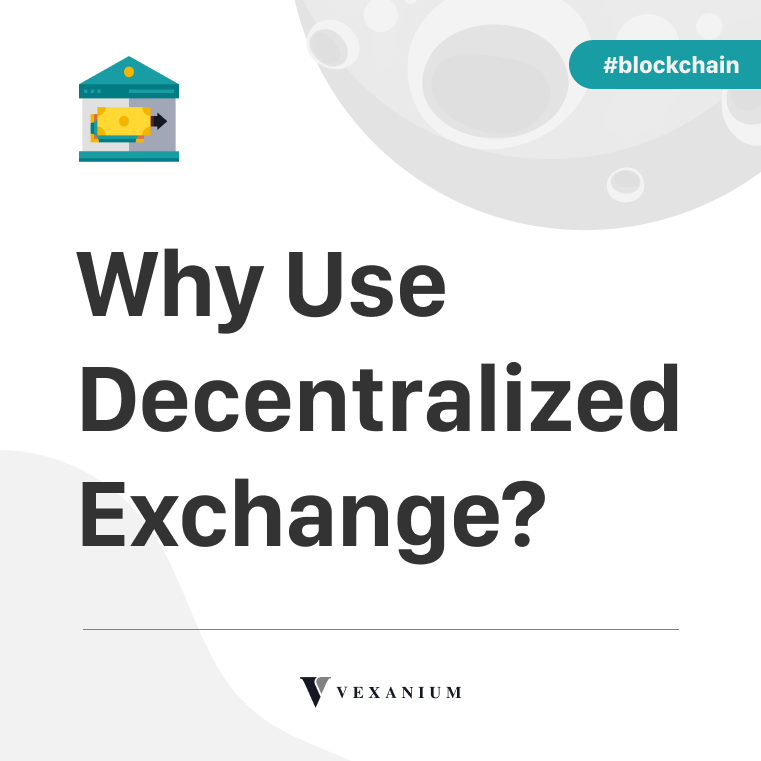Crypto token trading has become increasingly specialized since many exchanges have been created, this is due to the increasing adoption of cryptocurrencies. More than 500 crypto exchanges occur in early 2021. Those exchanges usually fall into two categories: Centralized Exchanges and Decentralized Exchanges (often called DEX).
No need for buy-orders and sell-orders are the innovations of trading mechanisms known for Decentralized Exchanges (DEXes), because each trade is executed individually by DEXes and the exchange rate is automatic based on the ratio of assets reserved in the market. DEXes are based on smart contracts running on a blockchain (typically Ethereum, Vexanium) that operate without a trusted central authority. Without needing to be different from the mechanism of intentional trading partners such as limit order books, completed trades in DEX will be immediately recorded on the blockchain with specific transaction costs (the gas price and gas limit in the Ethereum network).
Decentralized exchanges are becoming critical platforms for purchasing and selling crypto tokens as most of the centralized cryptocurrency exchanges are unregulated and lack proper insurance for the assets stored in the exchanges. This presents concerns for their safety, trustworthiness, and potential manipulations. Importantly, breaches, thefts, and exit scams are not uncommon for crypto centralized exchanges. Back in 2014, price manipulation was revealed on crypto exchanges including Mt.Gox which was responsible for more than 70% of bitcoin trading. Mt.Gox suddenly closed its platform and filed for bankruptcy as it claimed that the platform’s wallet was hacked and a great amount of the assets were stolen.
With DEXes, smart contracts keep tokens that are exchanged through a liquidity pool with the liquidity provider and the trader as their participant. Providers reserve their tokens in the liquidity pool, while traders exchange their tokens with the liquidity pool. This is one of the DEXes support operations to create a liquidity pool. The exchange of assets between the liquidity provider and the trader can happen in two steps. First, the traders send their tokens to the liquidity pool. Second, the liquidity pool computes the exchange rate and returns the targeted token to the traders. Another DEXes support is after creating the liquidity pool, liquidity providers can add a token pair to the liquidity pool or providers can also remove their tokens from the liquidity pool. The amount of tokens providers can redeem is related to the number of liquidity tokens they own. As has been mentioned, this makes DEXes a safe and fair option for their users.
Compared to centralized exchanges which became a prime target of hackers, DEXes provide better security as decentralized exchanges get bigger by common use as the DEXes have lower fees while trading on it. DEXes is also inclusive and has a fair ecosystem for anyone from any side of the globe, and DEXes doesn’t compile data privacy for the third party because usually there is no registration requirement for using the exchange. Well, that’s the benefit of using decentralized exchanges.
By offering a solution to the problem of centralized exchanges as well as competing with them, decentralized exchanges (DEXes) have things to consider, such as:
- Usability: there is a drastic range limit between the DEXes user experience and DEX’s poor user interface.
- Functionality: in terms of functionality, DEXes is still far from CEXes, no stop loss or limit orders are also a weakness in orders. The low trading volume also limits the variety of coins available which affects the quality of coins to trade.
- Speed: on blockchain it takes time to validate each transaction.
- Interoperability: there is a need for cross-chain exchanges and more decentralized platforms to interact with one another.
- Liquidity: fewer trading partners in decentralized exchanges marketplace lead to low transaction volumes and other classic problems.
Switching from centralized to decentralized exchanges will take place soon, as experts say. Gradually and steadily. As decentralized ideology is the closer fit of cryptocurrency and blockchain. Confidently, in the blockchain ecosystem, decentralization will be the essential pillar. [ ]
